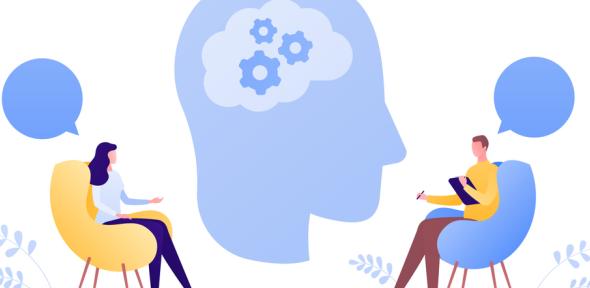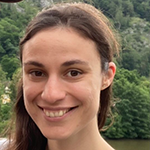Institute of Continuing Education (ICE)

Submitted by Amy Kingham on Fri, 07/01/2022 - 12:25
How does the human mind work? How does thinking happen exactly and what is the relationship between the mind, the brain and the body?
Whether it’s unpacking the complexities of normal, day-to-day cognitive functions, or seeking to understand – and address – different psychopathological disorders or mental illness, human beings have long been fascinated by the anatomy of thinking.
There’s never been a more exciting time to explore the mysteries of the human mind. Advances in technology innovation are revealing more and more about the mind body system and experimental behavioural research is a dynamic and rapidly-growing field.
The Undergraduate Certificate in Cognitive Psychology offers students a compelling and highly accessible introduction to the fundamentals of psychology – and the exciting world of behavioural research and experimentation. It’s little wonder that the course attracts students from every walk of life, says Academic Director, Dr Giulia Mangiaracina.
"Psychology addresses so many questions that are integral to human life: why we think the way we do; how memory, emotion, language and attention work and how we can stimulate the brain to improve them. It’s a thrilling field to study, to learn about and to work in. And the diversity of our students really reflects that.”
"Participants hail from around the world and a breadth of backgrounds. They join the course for different reasons, says Giulia. Some students are looking for an essential academic grounding in psychology before going on to further study. Others have a long-standing fascination that they wish to explore for personal or professional reasons."
“Sometimes our students become so fascinated that they decide to go further with their studies,” Giulia says. “We have other students who join us from healthcare or teaching and who are looking to enrich their professional understanding. And others are looking to change their life or career in some way. What they all have in common is a commitment to the learning that really speaks to their fascination with the subject.”
The part-time format of the course makes it highly flexible for everyone, whatever their motivation, she adds, because it can be combined with other commitments. Moreover, entry requirements do not stipulate existing knowledge or experience, as the content covers the fundamentals of modern psychology right through to the latest developments in neuropsychology and brain imaging. This is a comprehensive and dynamic learning experience, Giulia stresses.
“Over the course of 9 months, we cover the historical development of psychology to the experimental method in understanding the mind and behaviour. Across the three units, our students go from the background to the conceptual understanding of research and statistical methodology, and in the last term of the course, they have the chance to run their own experiments, collecting, analysing and presenting data.”
The course is taught exclusively online. Live interaction with tutors and peers is enabled by synchronous classroom sessions,” says Giulia. And the learning is augmented by videos, podcasts, forums, quizzes and the VLE, organised by students where they can connect to share questions, opinion and thoughts. The result is a learning experience that is simultaneously open and accessible to students from all over the world.
“This year we had students from the UK and the rest of Europe, North America, Asia and Africa and we all profit enormously from the diversity of perspectives, views and opinions. It’s both challenging and hugely rewarding to experience how different minds respond to the issues that we raise."
In addition to the knowledge and understanding they glean, students also emerge from the course with enhanced creative thinking and communications skills, adds Giulia. As a course requirement, they present the data they collect from their own experiments, which accelerates the ability to articulate theories, and to deliver and receive critical feedback.
"We support our students in building these really important skills. They gain the ability and the confidence to develop, share and defend their own new ideas and opinions across a range of fascinating topics. Whatever they choose to do beyond the course, they come away having mastered something – they learn to understand concepts and make them their own.”
This course is an inclusive learning experience. And Giulia would encourage anyone with a genuine interest in psychology to go ahead and apply.
“We don’t stipulate that you have qualifications or prior experience in this field, we only require proficiency in English. In terms of writing and presenting skills, we will give you all the support you need to develop confidence and capability.”
This is a learning environment that combines all the academic quality of Cambridge and a hugely inclusive and welcoming space to learn and to explore new ideas, she says.
“You’ll develop new skills, and you’ll come away seeing your own life differently. So if you feel the passion for psychology, go for it!

Alma is a teacher based in Germany. She tutors secondary students in STEM subjects.
An interest in psychology coupled with a desire to build more effective learning relationships with her pupils brought her to this course. The experience has resulted in huge rewards in different areas of her career, she says.
“Psychology is hugely bound up with teaching – especially when you’re teaching adolescents with developing minds. But the standard teaching qualifications don’t really go into psychology in depth, and when you are practicing it can be quite hard to find professional development opportunities. This course was unique. It connected all the dots between the research and classroom practices and techniques.
“The course has also impacted the work I do in coaching and mentoring students back in my old high school. I’m very motivated to give back in this sense, and I’ve acquired new tools to help young people reframe and address issues. So it’s helping me to change lives for the better.”
Alma is at the early part of her career and her plans for the future are starting to take interesting shape. “Whatever path I follow, it’s very clear to me that psychology will be a huge part of it."
Find out more about the Undergraduate Certificate in Cognitive Psychology.
---
This article was originally published in the Lent - Easter 2022 edition of Inside ICE.